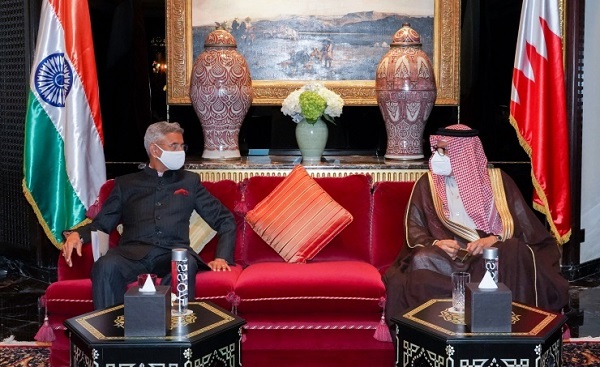Alwaght- On November 24, the Indian Foreign Minister Subrahmanyam Jaishankar paid a five-day visit to the UAE and Bahrain. In Bahrain, he met the Crown Prince Salman bin Hamad Al Khalifa. According to a statement by the Indian foreign ministry, the officials of the two countries discussed bilateral, regional, and international affairs and agreed to boost “historical” Indian-Bahraini relations in defense, maritime security, space technology, trade, investment, infrastructure, information technology, healthcare, hydrocarbons, and renewable energies.
The ties between India and the Persian Gulf Arab states have been on a fast track with strategic significance. This is influenced by geopolitical changes on the two sides of Asia.
Arab-Israeli normalization’s influence on Persian Gulf-Indian Peninsula relations
One of the most important geopolitical changes in West Asia is the change in the balance of power gradually experienced. The rise of the Iran-led Axis of Resistance in the region and such deep changes as the collapse of Saddam dictatorship in Iraq in 2003 and the Arab uprisings of 2011 beside the decline in the US power of influence regionally and globally motivated Washington, which finds the balance of power shifting against the favor of its regional allies especially Tel Aviv, to seriously put high on its agenda building an Arab-Israeli alliance to take on the Iranian regional influence. Under the US pressures, the UAE and then Bahrain announced normalization with the Israeli regime and the next normalizers would likely be Saudi Arabia and Oman.
This change, in turn, affected the Pakistani relations with the Persian Gulf sheikhdoms and the central factor here is Islamabad’s opposition to normalization. Pakistan, whose nation has always been a firm advocate of the Palestinian cause, is the only Muslim nation with nuclear arms. The Israeli regime has always found this a threat to its national security and this gives every reason to Tel Aviv to bolster political and military ties to New Delhi, the archenemy of Islamabad.
When Abu Dhabi and shortly later Manama gave publicity to their ties to Tel Aviv, Islamabad was among the serious opponents of the move, to the Saudi, Emirati, and Bahraini frustration. Following the signature of the so-called Arab-Israeli peace deal, Prime Minister Imran Khan of Pakistan said that any recognition of the Israeli government will trigger strong opposition from the Palestinian nation. He added that Pakistan wants a just solution to the Palestine problem and will not take any decision contrary to the aspirations of the Palestinian nation.
The gradual closeness of the Persian Gulf states to the Israeli government stands as a cause for their division with Pakistan, something showing itself in the withholding of their support in the most important foreign policy case of Pakistan the Kashmir dispute. Albeit, it should not be forgotten that prior to the normalization, the Saudi-Emirati ties to Pakistan went unprecedentedly chilly as the latter rejected a demand by the two to engage in the aggression against Yemen. In 2015, the year the Saudi-led alliance began its military campaign against Yemen, the UAE unveiled plans to cut 15 percent of Pakistani workers and even companies, constituting a big economic blow to the Islamabad government.
To fill the gaps and reverse the damage amid big economic troubles the nation already faced and the need for foreign support, Pakistan turned head to Turkey and Qatar, two most important enemies of Saudi Arabia and the UAE, as representatives the Muslim Brotherhood axis.
In the middle of the atmosphere, India finds the opportunity ripe to promote ties to the Persian Gulf monarchies. Last year, Narendra Modi was the first Prime Minister to visit Bahrain. He signed in Manama a string of MoUs including space and military cooperation. Modi also visited the UAE, the third trip to the Arab country since he assumed office in 2014.
The invitation to the Indian FM comes as recently the UAE imposed a visa ban on several countries including Pakistan. So, India is grasping the point about consonance of its geopolitical interests with the emerging Persian Gulf states’ bloc.
China-US competition in the Persian Gulf
From another aspect, the American foreign policy shift to the East and rivalry to China is influencing the Arab-Indian closeness.
Aspiring to block the Chinese power gain path in East Asia, the US heads to advanced ties with India as the key regional rival of China. Basic Exchange and Cooperation Agreement for Geo-Spatial Cooperation (BECA), signed in October with New Delhi, opened a new chapter of the military partnership between the two countries.
Meanwhile, deeming the Chinese toehold deepening in West Asia including the “Road and Belt Initiative” a threat to its interests in the region, the US looks at augmented ties with India as building a hurdle in front of the growing Chinese influence.
As the biggest oil importer, China has changed to the top trade partner of many regional states. It is the top trade partner of the UAE and Saudi Arabia. The non-oil trade volume with Abu Dhabi in 2017 was reported as $53.3 billion and with Riyadh in 2018 $37.5 billion. Last year, during the trip to the UAE as the top Persian Gulf economy President Xi Jinping of China signed a strategic trade partnership deal with the Emiratis, something stirring the American worries about the spread of the trend to other regional states.



























